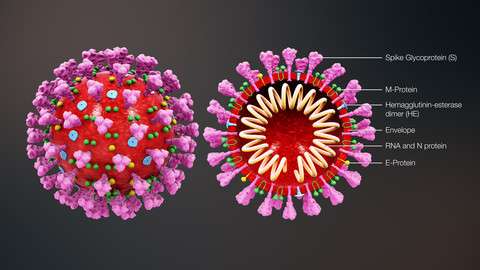
Théodore Géricault painting of The Raft of the Medusa, which hangs in the Louvre Museum, Paris (Photo: Wikimedia)
In 1816, the Frigate of Medusa, sailing from France to Senegal for the purpose of colonisation, sank in Mauritanian waters. Of the 450 crew members, 250 managed to survive thanks to the support boats, but they left 147 people behind on an improvised raft.
Of the latter, only 15 survived after two weeks adrift in the Atlantic Ocean. It is a tragic story, immortalised by the painter Théodore Géricault in his work Le Radeau de la Méduse [The Raft of the Medusa], and exposes the darker side of humans, among the crimes committed on board, the acts of egotism and the loss of dignity.
-

The delta variant of Corona-19. The report calls for an effort on harmonising data collections in European countries – not just between countries but also between topics (Photo: Wikimedia)
The best-selling idea at the beginning of the pandemic, worn to exhaustion, was that in the fight against this invisible virus we would all be in the same boat. Whenever I heard these words, I could not help but follow Anselm Jappe’s lines in On the Raft of the Medusa. When you are told “we are all in the same boat”, be suspicious. In fact, 205 years later, “we are all on Medusa’s raft”.
The Covid-19 crisis has exposed or even exacerbated inequalities. It has also highlighted the consequences of existing health inequalities suffered by people belonging to vulnerable groups, such as migrants and minority ethnic groups, homeless people, and older population.
In late 2020, as part of the PERISCOPE project – which stands for Pan-European Response to the Impacts of Covid-19 and future Pandemics and Epidemics – a group of 32 partners began studying the socio-economic and behavioural impacts of the pandemic.
This year, a working group composed of the London School of Economics, Mental Health Europe, Karolisnska Institute, University of Ghent, and INSERM, published a report focusing on health inequalities. Drafted under the coordination of the Federation of European Academies of Medicine (FEAM), the “Analytical report on health inequalities with emphasis on vulnerable groups” displays some of the difficulties in this area.
One of the key takeaways of the document is that national and European recovery strategies should pay greater attention to meet the needs of the most vulnerable in our society. Impacts of health policy measures on vulnerable groups should be better assessed and mitigated.
To be effective, or to have a greater chance of effectiveness, policies must be backed up with data.
As stated in the report, the Covid-19 crisis highlighted the impact of limited quality data on understanding health inequalities and inform concrete action.
Survival of the weakest?
In the document, the group also calls for an effort on harmonising data collections in European countries. This segmentation does not only occur between countries but also between topics.
Inequalities in healthcare access, mental health care or Covid-19 vaccine may overlap on vulnerable populations. This highlights the need for more comprehensive and multidisciplinary approaches.
Collection of data on health inequalities is key to be capable of measuring the differentiated impacts on vulnerable populations and make the existing gaps visible. This need for harmonised and comparable data has always been essential for research, but the ongoing pandemic has underscored the urgency of such an effort.
This view is also supported by the report published in November this year by FEAM and ALLEA (European Federation of Academies of Sciences and Humanities), Health Inequalities Research: New methods, better insights?.
Research using new methods can play an important role in informing policies to narrow the health gap, but requires investments in data infrastructures which allow these methods to be applied.
In the document, the European experts call on the European Commission and on national governments to support research on health inequalities, including research that explores the variation in socioeconomic conditions, health outcomes and policies between European countries.
There is a long way to go in tackling health inequalities.
We should follow this trail: More research, more information, more discussion, better policies. Investment in science, innovation, and research has never been as crucial as it is now. The work in these areas allows us to move towards a more equal society.
The European Commission needs to lead the way by setting clear objectives. Member states should transpose these lines into national legislation and programmes. To remain in Medusa’s raft is not an option for thousands of people in vulnerable situations.
Source: euobserver.com